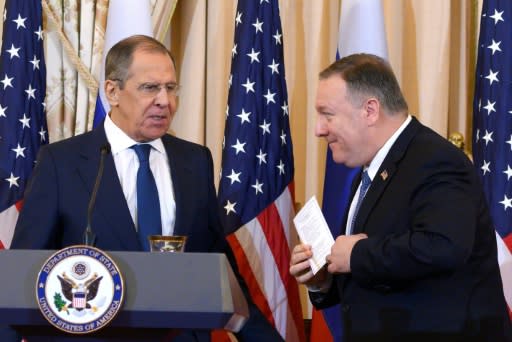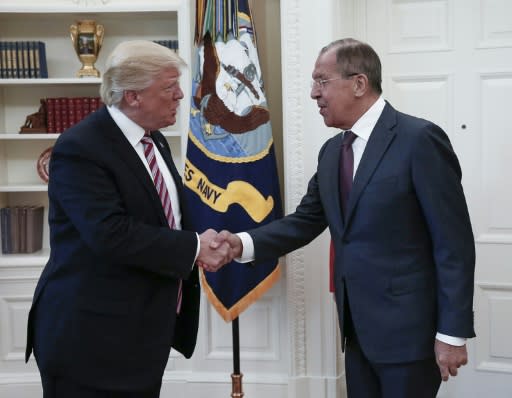Russian FM warned on election meddling but invited by Trump
President Donald Trump warned Moscow against meddling in next year's election, the White House said Tuesday, but Russia's foreign minister denied the issue came up in a Washington meeting that drew controversy for occurring at all. On the very day that House Democrats unveiled impeachment charges against Trump related to election interference, Foreign Minister Sergei Lavrov met Trump behind closed doors at the White House after saying he sought more cooperation. The White House in a statement said that Trump "warned against any Russian attempts to interfere in United States elections and urged Russia to resolve the conflict with Ukraine." Speaking to reporters moments afterward, Lavrov said he had not seen the White House account but said: "We haven't even actually discussed elections." US intelligence found that Russia, among other steps, manipulated social media to sway the 2016 election in Trump's favor. The mogul-turned-president is fond of denouncing the "Russia hoax" and has pressed an alternative theory, roundly rejected by US intelligence, that rival Ukraine in fact interfered in the election. Lavrov, holding a news conference earlier with Secretary of State Mike Pompeo, seized on the idea of a Ukrainian plot, saying it showed "the absurdity of the accusations against us." Pompeo, a stalwart ally of Trump who has entertained the president's views on a Ukrainian plot, stood firm that "our Russian counterparts" interfered in 2016 and issued his own warning. "The Trump administration will always work to protect the integrity of our elections, period," Pompeo said. "Should Russia or any foreign actor take steps to undermine our democratic processes, we will take action in response." Trump is facing impeachment after the White House delayed nearly $400 million in aid to Ukraine, which is battling Russian-backed separatists, as he pressed Kiev to investigate the election theory and to dig up dirt on his domestic rival Joe Biden. - Criticism of White House visit - Democrats said that Lavrov's visit only confirmed suspicions about Trump, who according to protocol would rarely receive a foreign minister. Representative Eliot Engel, chairman of the House Foreign Affairs Committee, accused Trump of "cozying up to autocrats" and demanded a full account of the closed-door meeting. "While dialogue with the Russians is important, especially for strategic stability and the future of arms control, I have no confidence in President Trump to defend our interests in these conversations," Engel said. Representative Adam Schiff, who led the impeachment hearings, recalled how Trump last time reportedly bonded with Lavrov over the US president's firing of the FBI chief, who had investigated Russian election interference. "Today, they can celebrate the success of Russian propaganda," Schiff said, in apparent reference to the Ukrainian meddling theory. Trump also invited Lavrov to the White House during his last visit to the US capital in May 2017. After that meeting, The Washington Post reported that the US leader shared with Russia classified details on a plot involving the Islamic State extremist group. - Firm on Ukraine - Pompeo vowed not to budge on Ukraine, saying that the United States would defend its sovereignty. "I reiterated that Crimea belongs to Ukraine," Pompeo said. The talks in Washington come a day after Putin held a landmark first meeting with Ukraine's president, Volodymyr Zelensky, in Paris, although they did not reach any breakthrough. Lavrov in turn pressed Pompeo for the quick renewal of the New Start treaty, the last remaining major arms treaty between the United States and Russia after this year's demise of the Intermediate Range Nuclear Forces treaty. "The ball is in our American partners' court," Lavrov said. Negotiated under Trump's predecessor Barack Obama, New Start, which expires in February 2021, obligated the two powers to halve their arsenals of strategic nuclear missile launchers. The Trump administration wants a new treaty to include China, which has a quickly growing, but still much smaller, arsenal than Russia and the United States. Lavrov said that Russia was open to a "multilateral process" that includes China as well as other Western states -- but noted that Beijing has rejected entering New Start talks. "The situation naturally requires negotiations, because there is no specific offer on the table by our American partners and it will take some time," he said. Pompeo said that threats have changed and that a new treaty needs to look at more than conventional weapons. "We believe not only do the conversations need to be broadened to include the Chinese Communist Party, but they need to be broadened as well to encompass the full range of instruments of power," he said. Russian Foreign Minister Sergei Lavrov departs the White House after meeting with US President Donald Trump, an encounter that sparked anger from Democrats US Secretary of State Mike Pompeo (R) voiced hope for more productive ties with Russia but made clear that the two powers had plenty of disagreements and warned Foreign Minister Sergei Lavrov (L) about 2020 election integrity US President Donald Trump (L) and Russian Foreign Minister Sergei Lavrov, pictured at their last meeting in May 2017, where Trump was accused of sharing classified information US Secretary of State Mike Pompeo (2L) meets at the State Department with Russian Foreign Minister Sergei Lavrov (2R), who pressed Pompeo for quick renewal of the last remaining major arms treaty between the two countries





